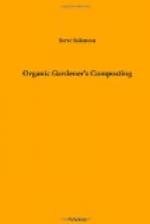The price of any seed meal is strongly influenced by freight costs. Cottonseed meal is cheapest in the south and the southwest where cotton is widely grown. Soybean meal may be more available and priced better in the midwest. Canadian gardeners are discovering canola meal, a byproduct from producing canola (or rapeseed) oil. When I took a sabbatical in Fiji, I advised local gardeners to use coconut meal, an inexpensive “waste” from extracting coconut oil. And I would not be at all surprised to discover gardeners in South Dakota using sunflower meal. Sesame seed, safflower seed, peanut and oil-seed corn meals may also be available in certain localities.
Seed meals make an ideal starting point for compounding complete organic fertilizer mixes. The average NPK analysis of most seed meals is around 6-4-2. Considered as a fertilizer, oil cakes are somewhat lacking in phosphorus and sometimes in trace minerals. By supplementing them with materials like bone meal, phosphate rock, kelp meal, sometimes potassium-rich rock dusts and lime or gypsum, a single, wide-spectrum slow-release trace-mineral-rich organic fertilizer source can be blended at home having an analysis of about 5-5-5. Cottonseed meal is particularly excellent for this purpose because it is a dry, flowing, odorless material that stores well. I suspect that cottonseed meal from the southwest may be better endowed with trace minerals than that from leached-out southeastern soils or soy meal from depleted midwestern farms. See the last section of Chapter Eight.
Some organic certification bureaucracies foolishly prohibit or discourage the use of cottonseed meal as a fertilizer. The rationale behind this rigid self-righteousness is that cotton, being a nonfood crop, is sprayed with heavy applications of pesticides and/or herbicides that are so hazardous that they not permitted on food crops. These chemicals are usually dissolved in an emulsified oil-based carrier and the cotton plant naturally concentrates pesticide residues and breakdown products into the oily seed.
I believe that this concern is accurate as far as pesticide residues being translocated into the seed. However, the chemical process used to extract cottonseed oil is very efficient The ground seeds are mixed with a volatile solvent similar to ether and heated under pressure in giant retorts. I reason that when the solvent is squeezed from the seed, it takes with it all not only the oil, but, I believe, virtually all of the pesticide residues. Besides, any remaining organic toxins will be further destroyed by the biological activity of the soil and especially by the intense heat of a compost pile.
What I personally worry about is cottonseed oil. I avoid prepared salad dressings that may contain cottonseed oil, as well as many types of corn and potato chips, tinned oysters, and other prepared food products. I also suggest that you peek into the back of your favorite Oriental and fast food restaurants and see if there aren’t stacks of ten gallon cottonseed oil cans waiting to fill the deep-fat fryer. I fear this sort of meal as dangerous to my health. If you still fear that cottonseed meal is also a dangerous product then you certainly won’t want to be eating feedlot beef or drinking milk or using other dairy products from cattle fed on cottonseed meal.




